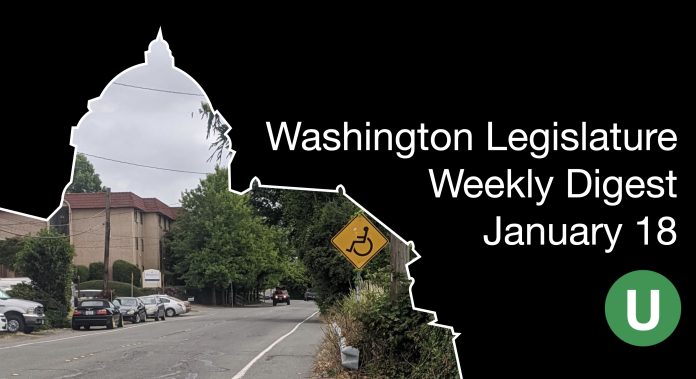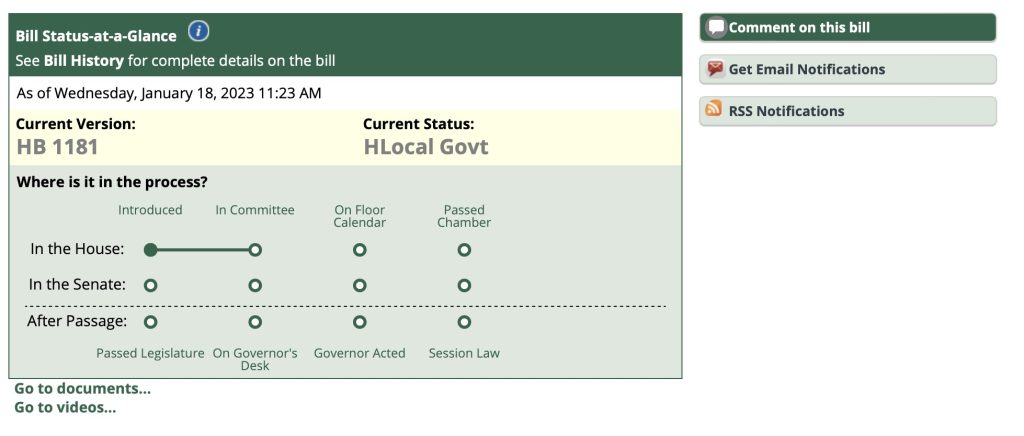
More housing bills queued up in Week 2
Welcome to the second week of the Washington State Legislature 2023 Session. We have added two new bills to the following list, for your convenience, as well as some consideration of the term “jaywalking” and the differences between comments versus testimony.
- Comments versus testimony, and how to submit them to the legislature
- Important Bills at a Glance
- HB 1110 – Missing Middle
- HB 1181 – GMA Climate Change provisions
- HB 1045 – Evergreen Basic Income pilot
- HB 1026 – Local Government Design Review Reform
- HB 1131 – WRAP Act (bottle deposit and packaging reform)
- HB 1040 – Aviation and Aerospace Advisory Committee
- SB 5466 – Promoting Transit Oriented Development
- SB 5383 – Concerning Pedestrians Crossing and Moving Along Roadways
- The Week’s Focus: Why do away with jaywalking?
Comments versus testimony, and how to submit them to the legislature
Several of the bills that The Urbanist is following had initial public hearings over the last week. This included HB 1110, Rep. Jessica Bateman’s missing middle housing bill that would implement statewide zoning reform. Over the long holiday weekend, Bateman rallied social media to see over 1,800 people sign in PRO, testifying for the legislation and affordable housing across the state. Comments on the bill are still being accepted.
Which raises the question of the difference between commenting versus testifying about a bill. Comments are your feelings as a constituent conveyed to an elected official. Testimony is an official part of the legislative process and is constrained by time limits and committee rules. Both are important. Comments supports and pressures legislators’ votes on bills. Testimony gets bills through the legislature as the last public input before votes or committee actions.
Commenting on a bill is very straightforward and can happen any time. To the right of the Status-at-a-Glance on each bill’s website, there are three tabs. Email notifications and RSS notifications send updates about the bill to your preferred contact. At the top is “Comment on this bill.” Click on it and follow the instructions. You will be asked for an address to verify a legislative district. Your comments will be sent to the legislators in your district that you select to receive them.

Testimony is time sensitive. For those bills that are preparing to have a public hearing, the legislature receives testimony through the committee that is considering the bill. From either the bill website linked in the list below or the master committee schedule, find out when the legislation is before a committee. Going to the Committee Sign In page, select whether the committee is in the House or Senate. Then a new screen will ask for the name of the committee and the date of the meeting. Bills on the agenda will appear and you can select testify or submit written testimony as needed.
Opportunities to testify at public hearings open the day before the committee meeting. Virtual and live testimony sign-in closes one hour before the meeting. Written testimony is accepted up to 24 hours after the committee meeting ends.
Important Bills at a Glance
HB 1110/SB 5190 – Increasing Middle Housing In Areas Traditionally Dedicated to Single Family Detached Housing
- Lead Sponsors: Rep. Jessica Bateman (D – Olympia) and Sen. Yasmin Trudeau (D – Tacoma)
- Link: the House Bill, the Senate Bill
- Description and Notes: Missing middle housing legislation allowing fourplexes everywhere zoned single family and sixplexes near transit
- Current Status: Jan. 17 – Public hearing in the House Committee on Housing at 4pm
- Resources: Check out The Urbanist’s team breakdown of this very important legislation.
HB 1181/ SB 5203 – Improving the State’s Response to Climate Change by Updating the State’s Planning Framework
- Lead Sponsor: Rep. Davina Duerr (D – Bothell) and Sen. Liz Lovelett (D – Anacortes)
- Link: the House Bill, the Senate Bill
- Description and Notes: Reintroduction of last session’s HB 1099, a bill to compel jurisdictions to put climate change provisions in their Comprehensive Plans.
- Current Status: Jan. 17 – Public hearing in the House Committee on Local Government at 10:30am.
Jan. 20 – Scheduled for executive session in the House Committee on Local Government at 10:30am. - Resources: Please see December’s Meetup with Futurewise and Futurewise’s campaign page.
HB 1045 – Creating the Evergreen Basic Income Pilot Program
- Lead Sponsor: Liz Berry (D – Seattle)
- Link: the House Bill
- Description and Notes: Monthly payment equal to the county’s fair market rent at the time of application for 7,500 pilot recipients. Kicks off July 1, 2024. Eligible: adults with income less than 200% of the federal poverty level with transitions or conditions associated with high economic instability: pregnant, kid under five, homeless, immigrant, refugee, asylee, exiting foster care or justice system, domestic violence, disability, or behavioral health disorder.
- Current Status: Jan. 11 – Scheduled for public hearing in the House Committee on Human Services, Youth, & Early Learning at 1:30pm
Jan. 20 – Scheduled for executive session in the House Committee on Human Services, Youth, & Early Learning at 8:00am. - Resources: We have a South Park pilot of Guaranteed Basic Income, and Scientific American’s recent look at Universal Basic Income.
HB 1026 – Local Government Design Review Reform
- Lead Sponsor: Amy Walen (D – Kirkland)
- Link: the House Bill
- Description and Notes: Limits design review for housing to administrative design review and drops public meetings by external boards. Has the potential to overcome predatory delays by removing the local power to require public meeting design review for housing.
- Current Status: Jan. 16 – Executive session scheduled, but no action was taken in the House Committee on Housing at 1:30pm.
Jan. 19 – Scheduled for executive session in the House Committee on Housing at 8:00am. - Resources: The Urbanist’s coverage of Seattle’s need to overhaul design review and the first tacit steps.
HB 1131 – Improving Washington’s Solid Waste Outcomes (WRAP Act)
- Lead Sponsor: Berry
- Link: the House Bill
- Description and Notes: Producer responsibility for packaging and paper products, postconsumer recycled content requirements, bottle deposit standards, and amendments to solid waste management.
- Current Status: Jan. 17 – Public hearing in the House Committee on Environment & Energy at 4:00pm.
- Resources: Check out Ashli Blow’s article introducing us to the Washington Recycling and Packaging Act (WRAP Act) and the need for it now.
HB 1040 – Aviation and Aerospace Advisory Committee
- Lead Sponsor: Walen
- Link: the House Bill
- Description and Notes: Aerospace and aviation advisory committee putting together a list of the industry’s strengths and needs for the Secretary of Transportation. Lots of representation on the committee from aerospace and aviation, but only one rep from a “statewide environmental organization.” The committee’s consideration of greenhouse gases is item F after expansions and tech considerations.
- Current Status: Jan. 11 – Scheduled for public hearing in the House Committee on Innovation, Community & Economic Development, & Veterans at 8:00am.
Jan. 20 – Scheduled for executive session in the House Committee on Innovation, Community & Economic Development, & Veterans at 10:30am. - Resources: A very extensive article from the Journal of Air Transport Management about the outsize impact that aircraft have on greenhouse gases and the possibility of net-zero business models, should that be a higher-than-F level priority.
SB 5466 – Promoting Transit Oriented Development
- Lead Sponsor: Marko Liias (D – Edmonds)
- Link: the Senate Bill
- Description and Notes: A bill requested by the Governor’s Office that acts as a complement to HB 1110’s missing middle push.
- Current Status: Awaiting introduction. See text here.
- Resources: The Urbanist has done a little coverage of transit-oriented development (TOD) in the past. And some good info on this TOD bill from Sightline Institute.
SB 5383 / HB 1428 – Concerning Pedestrians Crossing and Moving Along Roadways
- Lead Sponsors: Sen. Rebecca Saldaña (D – Seattle) and Rep. Emily Alvarado (D – Seattle)
- Link: the Senate Bill, the House Bill
- Description and Notes: Concise and to the point. “A pedestrian may cross a roadway at any point unless a reasonably careful person would realize there is an immediate danger of a collision with a moving vehicle, a person operating a bicycle, or personal delivery device.” Then it supersedes all local rules to the contrary.
- Current Status: Jan. 16 – First reading, referred to Transportation.
- Resources: See below!
This Week’s Focus: Why do away with jaywalking?
The history of jaywalking laws indicates they were a burden-shifting mechanism to take the responsibility of care off of drivers and instead put the assumption of risk on pedestrians. The term comes from the idea of a jay, or rube, not understanding the rules of a city. However, the laws only arose after a pressure campaign by automobile interests to compel states and jurisdictions to allow speeding horseless carriages their free rein of the road. Few countries outside of the United States have such harsh rules for crossing away from marked intersections. Adam Ruins Everything did an excellent rundown of the troubling origins of jaywalking laws and the term.
As with many laws in the United States, jaywalking has become another method of segregation, shifting disproportionately onto neighborhoods of color that lack crosswalks and signalized intersections. Jaywalking laws become another pretext for law enforcement to stop or detain people of color and other marginalized groups such as homeless people, leading to dangerous situations that too often turn deadly.
In her announcement of the bill, Representative Rebecca Saldaña (D – LD37, Seattle) said, “while jaywalking laws may appear well-intended, they don’t actually keep pedestrians safe and may instead put them at risk. National data shows that jaywalking laws are disproportionately enforced against Black people and in neighborhoods lacking infrastructure and resources. Our streets and right of ways need to have the safety of all users built into the infrastructure.”
The bills — SB 5383 and its companion HB 1428 — were the result of the Free to Walk Washington Campaign, a coalition of two dozen organizations led by Transportation Choices Coalition (TCC), with The Urbanist among them. The organizations point out that the laws do not keep people safe, they are applied with racial bias, and repealing the laws would be a better use of public resources.
“Jaywalking laws are outdated, unhelpful, and oppressive,” said Alex Hudson, who is TCC’s executive director, in a statement. “These laws were written by the car manufacturers over 100 years ago to establish auto-domination of the streets and don’t keep people safe from traffic violence.”
If passed, Washington would follow Nevada, Virginia, and California in repealing jaywalking laws. The legislation comes after one of the deadliest years on Washington roads for pedestrians and cyclists.
Ray Dubicki is a stay-at-home dad and parent-on-call for taking care of general school and neighborhood tasks around Ballard. This lets him see how urbanism works (or doesn’t) during the hours most people are locked in their office. He is an attorney and urbanist by training, with soup-to-nuts planning experience from code enforcement to university development to writing zoning ordinances. He enjoys using PowerPoint, but only because it’s no longer a weekly obligation.

